The Ministry of Defence (MOD) has announced a £100 million tender for the Defence Fuels Global Resupply Capability (DFGRC) contract.
The contract aims to enhance the resupply capabilities of the UK’s armed forces by chartering tankers to transport fuel worldwide over the next five years, with the contract running until 31 July 2029.
According to the MOD, “The Ministry Of Defence (MOD), as the Contracting Authority, has an ongoing requirement to charter tankers for the resupply of all fuel types (Clean Petroleum Products) to UK and Overseas bases, Intra-OFD transfer plus support to the Joint Expeditionary Force Maritime (JEF(M)).â€
The contract will involve hiring vessels to deliver clean petroleum products to various UK and overseas bases, support internal transfers, and assist the Joint Expeditionary Force Maritime. The MOD seeks providers that meet specific financial and technical criteria to take on this project.
The selected vessels must adhere to stringent standards, including classification by a recognised member of the International Association of Classification Societies. They must also be fit to carry specified petroleum products safely and efficiently, meet operational standards for navigating through the Suez and Panama Canals, and have all necessary certifications and documents.
The crew must be fully qualified and trained according to international standards, ensuring safe and efficient operations. They must hold valid certificates of competence and comply with the International Convention on Standards of Training, Certification, and Watchkeeping for Seafarers.
The MOD say it is committed to maintaining high safety and environmental standards, requiring a certified safety management system, a documented environmental management system, and regular health, safety, and environmental performance reports.
Interested contractors have until 31 July 2024, to submit their bids, with the contract expected to be awarded soon after.



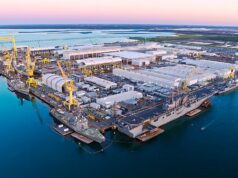
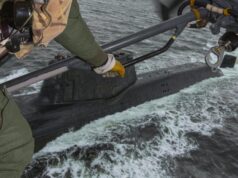

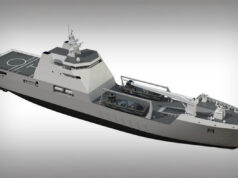

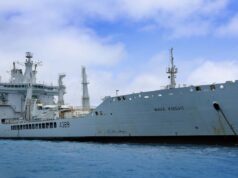
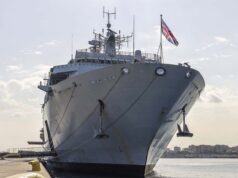
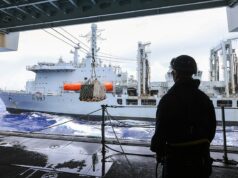
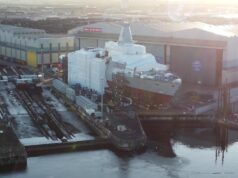


Was this a role previously undertaken by the Leaf Class Tankers?
Farther back still, late 60’s into the 70’s we had three big freighting tankers, I think run by the RFA, which went all over the world. One was the Ennerdale which I seem to remember came a cropper coming out of the Seychelles.
And 1980s and 1990’s coming to an end with the Oakleaf going!!
derwentdale, Dewdale (both returned to their owners on completion of charter) Ennerdale sank in the Seychelles after hitting Ennerdale Rock (then uncharted ). Mainly served East of Suez as mobile fuel depots with Seychellois crews
£100 million would be more than enough to resolve the RFA pay crisis, recruit more officers + ratings and then get the Waves and laid up Tide class to do this work.
We literally have taxpayer funded assets sitting idle and we plan to hand a contract to what will most probably be a foreign company using a foreign contracted ship.
I was wondering why we didn’t do it ourselves as it seems far more sensible…Then I realised that’s prob why …
I completely agree, however it would mean that would be unable to give a lucrative contract to a minister’s freind. Maybe I am just being cynical.
No you are not.
Totally agree ,what ever next 🙄
It’s your fault it’s not being done within MOD. Yours and mine and the press and all the members of the chatterati who launch in on the MOD when things go wrong. No wonder they are paranoid and go lowest possible risk and highest possible cost whenever possible. Our lack of forgiveness and their consequent fear of risk has many negative consequences. This is one of them.
If you hire a tanker you aren’t responsible for its whole-life costs.
Pretty sure it is currently done by James Fisher & sons with two tankers as required
Yes The MOD are shrinking the RFA even further
There is a photo today on Naval Lookout of 3 RFA’s in the wet basin at Cammell Lairds
Tiderace is joining Wave ruler for long term storage!!!!!!!!!! across the Mesey in Seaforth dock
The other two are Victoria and another Wave from a spruce up
Also showing are HMS Proteus and a nice superyacht
Apologies another Tide not Wave
The contract is currently held by James Fisher & Sons (UK owned and operated), it was given a final contract extension back in 2023; likely 24 months as this is the norm for medium length MOD support contracts. This is not RFA tasking, Defence Fuels (joint org) contract these tankers on an ‘as needed’ basis to move fuel around the Oil and Pipeline Agency network which includes bunkering at naval bases and depots; 6 in total stretching from Gosport to Loch Ewe, and air bases via the pipeline network. They also support overseas bunkering such as the strategic reserves at Gib, the Falklands and Cyprus and also contribute to the NATO free-fuels agreement obligations.
Defence Fuels sit under DE&S in Bristol and did some really interesting work developing a RAS capability with the RFA back in 2023 using the MV RALEIGH FISHER and a Tide Boat. Partly to build resilience and partly to bridge the capability gap for the RFA but it hasn’t even been used in anger.
Completely agree that the RFA needs sorting as a matter of priority but this is a different budget and a completely different capability which is also desperately needed; from memory the contract provided low risk, low through life cost, no additional impact on the Fleet and good value for money. The RFA are strung tight enough supporting the Fleet, they don’t need to be bunkering fuel around the UK and overseas territories on behalf of the Gov and NATO. This is a good news story, even if the hull isn’t grey!
During the 80-90s Maersk Line used to provide ocean tanker support to UK overseas bases on Cyprus, Ascension, where they had the on Station Tanker (the Maersk Ascension) for ship to ship transfer and MPA. Overseeing the fuel transfer to bulk storage was the responsibility of RAF trained fuels specialists. Also training was provided to Army and Foreign and Commonwealth students. So this is not a new concept. Although I suspect the contract has been expanded.
Good post. Well explained. The 6
OFDs are at Gosport, Plymouth, Campbeltown ( links to Macrihanish ) Garelochead, Loch Striven, Loch Ewe.
The old GPSS network is now run by a Spanish company, but the Defence Fuels Group at West Moors still oversee matters.
Hi DM, thanks. So I think the Oil and Pipelines Agency was split out of the GPSS when the contract was sold and still sits within the MOD as a bespoke corporation (it was via NCHQ, Matt Harrison as Director Support (2*) was on the Board a few years ago). So we still have some sovereign ownership for military purposes. I don’t know how the transfer of the logistics enterprise to the new Chief Defence Logs and Support has impacted the wiring diagram. I am a few years clear of this kind of work so may be out of date.
Evening. Well that is great to hear. I’d assumed the lot, including the DFSPs, Defence Fuel Support Points, like the big one near Aldermaston as an example, had gone private with the pipelines.
So what your saying is it’s effectively a GOCO, Govermnment Owned Contractor operated, if OPA is still about?
I couldn’t say either re CDL without checking, it all gets confusing with the endless changes.
Thank you.
Thanks for the clarification and context- nice to know we don’t have to be up in arms about every decision the MOD makes!
Hopefully James Fisher will win it again, keep it UK PLC
Agree it’s a scam to offload responsibility, fudge the issue whilst downgrading sovereign capabilities and not resolve the RFA issues. £100 million would easily solve the RFA recruitment issue whilst bringing all our tides and both Wave class back into service.
Crazy crazy crazy world of incompetence we live in.
Hopefully our new labour government will wake upto this matter.
A Tide or Wave is not designed to do this, and is much more expensive to operate.
This doesn’t degrade sovereign capabilities, MV Raleigh Fisher and MV Clyde Fisher are UK flagged vessels so could be requisitioned if needed.
£20m a year would not fix the RFA recruitment issue, and would not bring 3 tankers back into service.
They are also fitted for astern refueling . And discharged through floating hose.
Maersk had the contract until 2019 when they took there vessels off the UK shipping register. At that point James Fisher & son took over which would suggest the tankers need to be UK registered.
Panamax/Suezmax tanker will have an +80K Ton carriage capacity for dieso and avcat
Tide has around 19k Tonnes capacity
4 x trips by a Tide to do the same as a Panamax.
A lot cheaper and quicker to get a contractor to do this. A slow speed marine diesel chugging along at 18knts is way better than a mediums speed diesel electric drive.
This is not for RAS-capable vessels. This looks like a renewal of the existing commercial contract for supply of bulk fuels to UK bases, using ordinary civilian tankers
Is there really a need with a ‘Fleet’ that seems to be alongside most of the time inactive and broken. Yes that amount would solve the RFA issue and get out own tankers to sea which are not only there for the UK but NATO being a major asset that is simply not available because of some suit in Whitehall who’s on far to big a wedge. ðŸ™
£100m seems a lot. £20m a year seems like a lot for basically a taxi service. I assume the MOD will still be paying for the fuel on top of that.
So a quick google shows that you can broker an Aframax Tanker for approx $50,000 a day, call it £40K. So £15M a year. Currently we have ready access to 2 tankers to meet MOD and NATO requirements, albeit not being tasked daily, rather we broker storage requirements on the tankers schedule. £20M a year seems about right to me.
That assumes exclusive assess if your saying daily rate. I’m going to assume they won’t be after exclusive use but rather access to tankers when required which i doubt will be all the time.
Plus if your going for a 5 year deal you would expect a heavy discount over the day rate.
Steve, I would hope that greater minds and well-paid contracting staff have done due diligence. My fag-packet maths is purely iterative and to demonstrate a rough ballpark figure; which seems ‘about right’ for an enthusiastic amateur logistician like me. Against a £52B budget, 100m seems reasonable for a crucial capability that supports the global defence estate. Even if it is not a sexy front-page bit of kit.
We currently have periods when we do have exclusive use of the capability (when we need them) and times when we do not (when we don’t). This way we let the demand govern the output and can target our extraordinary requirements (trips to the Falklands for example, or RASing trials with the RFA) at periods when we have sole chartering authority. This reduces financial and operational waste.
I’m not going to stick my head out of the trench and say this is exceptional value for money or that MOD contracting is the world standard. But sometimes, we get a functioning and fit-for-purpose capability for a reasonable price… as I say it feels ‘about right’ to me.
I don’t. It’s clear their is a stupid level of corruption going on, causing serious bad value to the tax payer. I don’t think you can avoid it completely, just as long as it never gets to the level of russia/China. Doesn’t mean I have to be happy about my tax being wasted.
This Labour government said they wanted to work with our Military industry ,it’s not a very good start 🙄
We should have our own rfa big tankers ,go to korea or Japan for them british crewed and flagged and owned rfa spec
For over a century (following a Royal Commission) the Admiralty/MOD (owned or bare boat chartered tankers) freighting its fuels worldwide under the banner of the Director of Stores/RNSTS using RFAs. For periods over this time HM Treasury earned a good revenue by contracting these assets (when surplus to Admiralty requirements) to actually freight cargoes for commercial companies. A reverse of today’s situation.